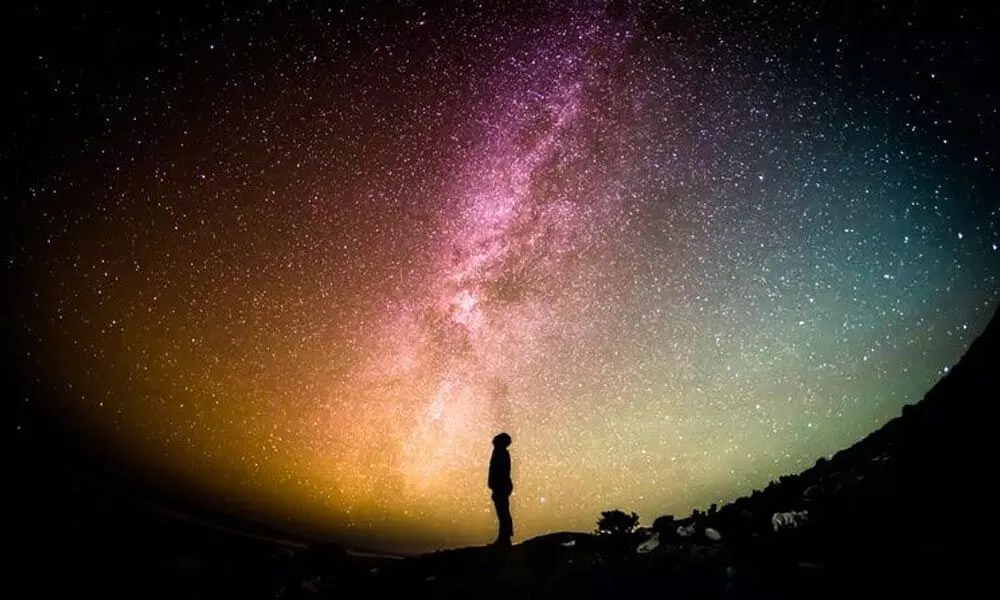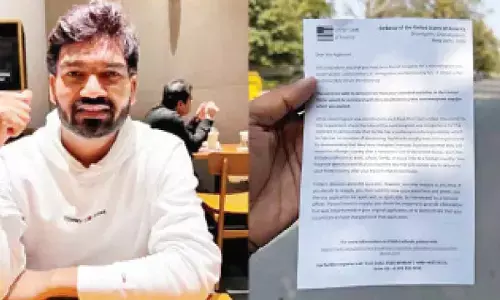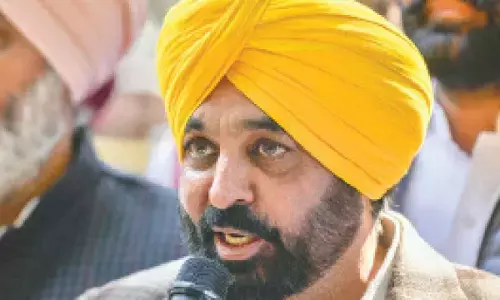A tiny planet gobbled by greed, violence

A tiny planet gobbled by greed, violence
Cosmologists tell us that, according to what is known as the 'standard model', the universe in which we live was created by a' big bang' some 13.7 billion years ago
Cosmologists tell us that, according to what is known as the 'standard model', the universe in which we live was created by a' big bang' some 13.7 billion years ago. Space, as well as time, were created during that event. Therefore, there were no such things, as 'earlier' than that event or 'what' existed before.Cosmologists tell us that, according to what is known as the 'standard model', the universe in which we live was created by a' big bang' some 13.7 billion years ago. Space, as well as time, were created during that event. Therefore, there were no such things, as 'earlier' than that event or 'what' existed before.Cosmologists tell us that, according to what is known as the 'standard model', the universe in which we live was created by a' big bang' some 13.7 billion years ago. Space, as well as time, were created during that event. Therefore, there were no such things, as 'earlier' than that event or 'what' existed before.
Ever since its birth, the universe has been expanding in all directions at the rate of the velocity of light which, as most of us know, is 3x10 10 kms per second. In other words, the universe, today, has a radius of 13.7 billion light years.
Against the picture we have just described, let us put our own lives in the proper context in terms of space and time.
In terms of cosmological time, the average life expectancy of a human being is less than a blink of the eye, as compared to the age of the universe. Likewise, the planet we inhabit (described by Carl Sagan as the "Pale Blue Dot' in his book by the same name) is but a grain of sand in a beach. Compared to the Solar System, a tiny bit of the Milky Way Galaxy, which, in turn, is but a spot of space in the universe.
Let us leave aside, for the moment, the question whether the creation of the universe was the inevitable result of the interplay of the laws of nature, or the creation of a Supreme Being. All religions accept the latter to be true and have their own way of recognising and describing the infiniteness of space and time and the place humanity is accorded in it. They also have their own way of describing the omnipotence and omniscience of the Supreme Being. In one Shloka of a Stotra in Hindu prayers, for instance, God is described as being 'aadyantha soonyam avyayam...', or as being without beginning, without end and forever unchanging. Islam, on the other hand, describes God as the 'creator of everything' in the universe, while Christianity says that God is 'omnipresent, omniscient and omnipotent'.
In other words, both in terms of time and space, we are less significant than the spark that we see in a sparkler on Diwali day or the 4th of July. Given this transient, and insignificant, space time capsule in which human life is ensconced, should there be any time at all for negative feelings, and actions, such as conflict, war, anger, hatred or intolerance? Similarly, is it not wrong, and wasteful, to indulge in any activity other than that which is directed towards enhancing the quality of life of the downtrodden and excluded in this world of today?
Further, for the elected political leaders of our country today, the period of five years in office, and the attendant trappings, are much less significant than a whole human life and the experiences that go with it.
While, in a span of over 70 years, our country had made significant progress on several fronts - economic, social and political - it can hardly be gainsaid that much remains to be done. India has excelled in several areas, from the exploration of space and the Arctic to sports, literature and the performing arts. It has produced Nobel laureates and sent out her doctors and engineers to make significant contributions to the growth and development of various countries from Australia to the United States. On the other hand, poverty, deprivation, exclusion and iniquity persist. From the trading in children to ill treatment of women, and from Naxalism to terrorist activities, the country faces many challenges in internal security. And neighbours across the northern and western borders continue to threaten the territorial integrity of our nation. Food and nutrition insecurity, climate change and the alarming threats posed by pandemics are only a few among the many other challenges that are testing our abilities. Is it not, therefore, wrong, if not outright criminal, for political leaders to spend their time, and energy, on anything other than the betterment of the quality of life of the common man and the deprived? Is there, in particular, any place in the scheme of matters for things such as conflict and intolerance?
This is a good time for the world to recollect how Swami Vivekananda began his speech to the delegates of the World Parliament of Religions in Chicago in 1983 – "Brothers and Sisters of America", were soul-soothing words which had a magnetic impact on the audience.
All over the world, while the development in the world in physical terms has no doubt take place in an impressive way, it is regrettable that the Swami's call for brotherhood among peoples and nations has yet to materialise. Perhaps there is something in human nature which propels the forces of greed, violence, and oppression of the weak.
After the World War-I, it was hopped that humanity had learnt its lessons and would live in harmony with others. But, then, World War-II started, this time fought more brutally causing grater loss of lives and property. Now World War-III looms, with conflicts raging in Vietnam, Korea West Asia, Africa etc.
The Swami's vision for universal peace and brotherhood is timeless and universal. It is imperative to revive his vision of universal brotherhood and peace to make for a better future for mankind.
The Santi mantra 'Om, Santi, Santi, Santi', which is often quoted in Hinduism, Buddhism and Jainism signifies a call for universal peace. Likewise, the Bible extols the qualities of "peace, love and joy, while the Islamic greeting "Salam Alaykum" literally translates as "peace be upon you".
(The writer is former Chief Secretary, Government of Andhra Pradesh)




